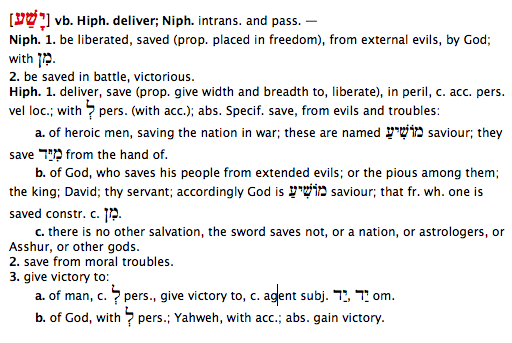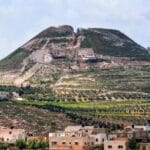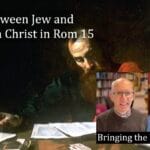
I have often heard it said that when God delivers us, he leads us from a sense of being trapped, hemmed in and confined to a sense of being in a ‘wide open space.’ I think I have probably said this myself in a talk or sermon on more than one occasion. I remember, many years ago, reading about it in relation to the story of Jacob and his meeting with Esau in Genesis 33; Jacob, who has relied on his wits all his life to get his own way—with other people and with God—finds himself at his wit’s end as he finally meets Esau again. But instead of judgement, he finds graciousness, and the graciousness of Esau he takes to be the graciousness of God, and he moves from the sense of being hemmed in by fear and dread to the open space of grace and peace.
This notion, of being in a tight spot or hemmed in and then experiencing God’s deliverance as a wide space, is evident at several points in the psalms. A good example is Ps 18:
3 I called to the Lord, who is worthy of praise,
and I have been saved from my enemies.
4 The cords of death entangled me;
the torrents of destruction overwhelmed me.
5 The cords of the grave coiled around me;
the snares of death confronted me.
17 He rescued me from my powerful enemy,
from my foes, who were too strong for me.
19 He brought me out into a spacious place;
he rescued me because he delighted in me.
It is quite striking how many of the psalms are written around the theme of conflict with the writer’s enemies, how oppressed he has been, and how (usually) God has delivered him, either by an act of rescue or an act of judgement on the writer’s enemies.
Another explicit example of this metaphor comes in Ps 118.5:
When hard pressed, I cried to the Lord;
he brought me into a spacious place.
(Ps 118 is particularly important in the NT, vv 25 and 26 forming the background to the accounts of Palm Sunday, and v 22 being understood by Jesus and Peter as anticipation of Jesus’ rejection by the Jewish leaders.)
It is worth noting that salvation in these contexts is very tangible, and not very far removed from common uses of the term in everyday speech today—it is about deliverance from actual enemies who oppress us. It is used in this sense in Zechariah’s prophetic song of praise we call the Benedictus in Luke 1.68–79:
69 He has raised up a horn of salvation [or ‘mighty saviour’] for us
in the house of his servant David…
71 salvation from our enemies
and from the hand of all who hate us— …
74 to rescue us from the hand of our enemies,
and to enable us to serve him without fear
75 in holiness and righteousness before him all our days.
It only becomes a ‘religious’ term once we recognise that our true enemies are not the people that oppose us, but the threat of sin (ours as well as theirs) and death (1 Cor 15.26). Thus the angel commands Joseph to ‘give him the name Jesus [Yeshua, ‘God saves’] because he will save his people from their sins.’
This idea of salvation as a wide open space is appealing not just because of these examples in the OT, but because (like so many of the Bible’s metaphors) is engages us psychologically with such power. When we feel people or things are against us, we do have this sense of being strangled, or hemmed in, or in a tight space. We might even use these metaphors ourselves. And when the situation changes, we feel we can breathe again, that we are no longer constrained—we are free to roam the wide open spaces of God’s deliverance and grace.
The example I have used in the past comes from a journey that, at one point, I made quite often. On the M40, travelling from High Wycombe towards Oxford, after travelling on a plateau, you come through a final cutting as the road bears gently to the right. The bend hides the view that opens up before you (I think somewhere near Princes Risborough) of a wide open plain—and it offers a very striking contrast to the narrowness of the cutting as you emerge from it. No wonder this idea features in so many sermons.
But we need to pause a little, since I think there are three issues with this metaphor which might qualify its use.
The first is with language. It is often claimed that ‘The Hebrew for salvation is yasha, which means “to bring into a wide open space.”’ (Forgive, for a moment, the move from noun to verb). From Hebrew lexicons it is not very obvious that this is in fact the case. Take the abridged version of Brown, Driver and Briggs (BDB), a standard lexicon:
There are some hints that it used in this way from the additional comments:
(prop. placed in freedom) (prop. give width and breadth to, liberate),
but I would need to see some more convincing evidence before going with this as ‘the’ meaning of the word. The straightforward sense is to be rescued from (oppressive) enemies; this can certainly feel like we have moved into a wide open space, but that is not the word’s ‘meaning’. Perhaps it would be better to talk of salvation ‘sometimes being equated with…’ rather than ‘meaning…’ something.
Secondly, it has often not been the experience of Christians that God has brought them into this sense of a ‘wide open space’ even though they have been ‘saved.’ A couple of years ago at New Wine, John Coles told the story of Horatio Spafford, who wrote the hymn ‘It is well with my soul’.
This hymn was written after traumatic events in Spafford’s life. The first was the death of his son at the age of 2 and the 1871 Great Chicago Fire, which ruined him financially (he had been a successful lawyer and had invested significantly in property in the area of Chicago that was extensively damaged by the great fire). His business interests were further hit by the economic downturn of 1873, at which time he had planned to travel to Europe with his family on the SS Ville du Havre. In a late change of plan, he sent the family ahead while he was delayed on business concerning zoning problems following the Great Chicago Fire. While crossing the Atlantic, the ship sank rapidly after a collision with a sea vessel, the Loch Earn, and all four of Spafford’s daughters died. His wife Anna survived and sent him the now famous telegram, “Saved alone …”. Shortly afterwards, as Spafford traveled to meet his grieving wife, he was inspired to write these words as his ship passed near where his daughters had died.
This is hardly a ‘wide open space’, and it is interesting that the words of the hymn avoid this kind of imagery, and instead articulate hope in eschatological terms—anticipating ‘the day when my faith shall be sight, The clouds be rolled back as a scroll; The trump shall resound, and the Lord shall descend.’
Thirdly, I was quite interested to find this idea of ‘salvation as a wide open space’ in a sermon online drawing on the work of the liberal theologian Marcus Borg. Salvation was not about waiting for some future event; it did not depend on our own lives or what we did; no, it was about enjoying the ‘wide open spaces’ of healing and life that God gives us now in Jesus. There was quite a strong sense that this ‘wide open space’ is one which is free from (perhaps petty, even ‘Pharisaic’) concern with regulations about holiness.
This is a rather stark contrast not only to all the language about future hope in the gospels and in Paul, but also to Jesus’ own depiction of what the ‘saved’ life looks like:
Enter through the narrow gate. For wide is the gate and broad is the road that leads to destruction, and many enter through it. But small is the gate and narrow the road that leads to life, and only a few find it. (Matt 7.13–14)
Echoes here of eyes of needles rather than wide open spaces. And it is fascinating to note that this is exactly the same dynamic we find in Ps 18—if we read to the end of the psalm. David is delivered into the wide open space, he says, because he has been walking the narrow path of obedience to God’s law. He does not find is constricting, but the path of life and freedom. We find similar paradoxes in Paul: he is ‘constrained by the love of Christ’ (2 Cor 5.14) and celebrates the ‘freedom for which Christ has set us free’ but longs we should use that freedom to walk only where the Spirit leads us (Gal 5.1, 16).
The moral here is that, when we use a metaphor from Scripture, and particularly such a compelling one, we need to attend carefully to the way that these metaphors are deployed—and whether they sit in tension with other images and ideas that hold them in tension.
But it also touches on a wider problem that we have in many parts of the church of the tension between grace and obligation. There is no limit to the kind of person to whom God offers his gracious invitation—the invitation is to forget self, take up the cross and follow him. The wide space of freedom means we can choose to walk the narrow path of obedience that Jesus walked and in which we follow.
If you enjoyed this article, why not buy me a coffee?

 Buy me a Coffee
Buy me a Coffee




























Yes. I don’t think I’ve heard many of the sermons you mention, but we need the wide space and the narrow gate, just as we need the easy yoke and the taken-up cross. By the way, thank you for your mention of Esau, in my view one of the unsung heroes of the Bible, “seeing your face was like seeing the face of God” indeed. Despite the mean comments of the writer to the Hebrews…
Yes. agreed. Esau gets a good write up there. So does Saul in 2 Sam 1:23 “Saul and Jonathan, beloved and lovely! In life and in death they were not divided; they were swifter than eagles; they were stronger than lions. Interesting that some people’s lives get good epitaphs even though their lives were less than exemplary. And Solomon, despite his failure still “slept with his fathers”. We don’t yet know who is ‘in’ and who is ‘out’. Being accorded bedfellows with David and Jonathan can’t be a bad thing.
As for wide spaces, just think of Satan going to and fro, up and down across the whole earth!
If Satan has investments they are probably in cruise liners and jet aircraft.
Penelope.
Esau is Edom. There is a need to read Obadiah if Esau is to be seen as a hero: so far from it, it is the opposite.
The great preacher Martyn Lloyd Jones saw the narrow gate as the gate of the gospel: there is only one way to the Father, Jesus Christ and we enter because of His death for our sins, by His merits alone. Once through the gate, we have the wide open spaces of God Himself and all His attributes and the Life of God through His Holy Spirit.